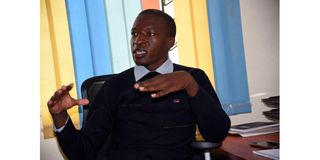Meet the man training male champions to end FGM

Peter Kemei, founding member of Men End FGM Kenya, during an interview at his office in Westlands Nairobi on October 19 ,2021.
What you need to know:
- Peter Kemei leads a campaign that lobbies stakeholders to prevail upon men to join the fight against FGM.
- Through Men End FGM they train men to become anti-FGM champions, especially in the country’s 22 FGM hotspot counties.
- At least 30 male champions have been trained in nine counties so far, with similar trainings lined up for the remaining devolved units.
Peter Kemei has been in the forefront championing the rights of girls and women, and pushing for gender equality in the country for years.
Through the Men End FGM Foundation, founded in 2013, he leads a campaign that lobbies stakeholders to prevail upon men to join the fight against FGM. He has partnered with Unicef, UNFPA and Anti-FGM Board in his advocacy.
The foundation trains men to become anti-FGM champions, especially in the country’s 22 FGM hotspot counties. They are taught about the dangers of FGM and how it negatively affects women. The training targets fathers, administrators, male students in secondary, colleges and universities, religious leaders and elders.
Awareness campaign
Once trained, the champions are released to their communities to spread the anti-FGM gospel and lead awareness campaign against the outlawed cultural practice, Mr Kemei says.
At least 30 male champions have so far been trained in nine counties so far, with similar trainings lined up for the remaining devolved units.
Counties where champions have been trained include Meru, Isiolo, Garissa, Wajir, Tana-River, Baringo, Elgeyo-Marakwet, Kajiado and Samburu.
Mr Kemei says they decided to involve men and boys in the FGM war after they realised they wielded so much power and influence in their respective communities.
“To win the fight against FGM and child marriage, it was prudent to rope in men in the campaign, to end these vices in our communities. Through these trainings, the champions get skills on how to engage in advocacy and community dialogues,” says Mr Kemei.
He notes that they decided to use male power to influence decisions at family, church and community levels. The male champions, he observes, now have a chance to see the reality and brutality of FGM.
Anti-FGM polices
In addition to training male champions, the foundation also conducts community dialogues to create awareness on the dangers and the negative health effects of FGM.
Currently, the organisation is undertaking a 12-month acceleration FGM abandonment program in Samburu and West-Pokot counties. During this period, they are pushing for the enactment of anti-FGM polices in the two counties. They also plan to meet the elders and known cutters, to prevail upon them to join in the fight.
Mr Kemei says his happiest moment was when after training of male champions in Baringo last year, a group of men told him they had changed their minds on subjecting their daughters to the cut.
The men, he says, told him they never knew the pain the girls subjected to the cut underwent, and the life-long negative health complications associated with the outlawed cultural practice.
He attributes low literacy levels and lack of political goodwill and support from religious leaders, as among the factors contributing to the high FGM prevalence in the 22 hotspot counties.
“FGM has severe lifelong medical and psychological complications and I urge the communities still practicing it to end it,” he says.





